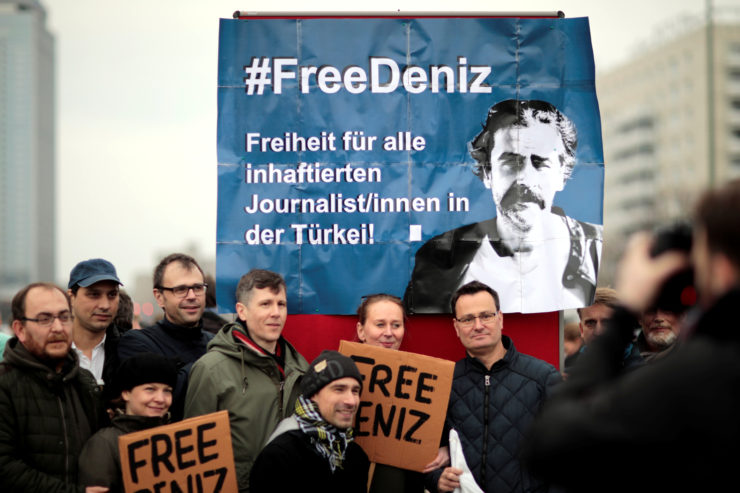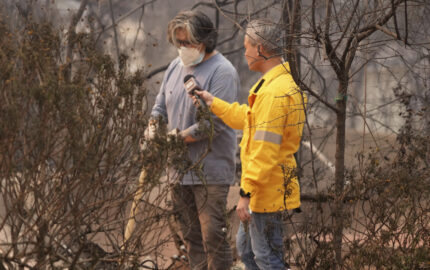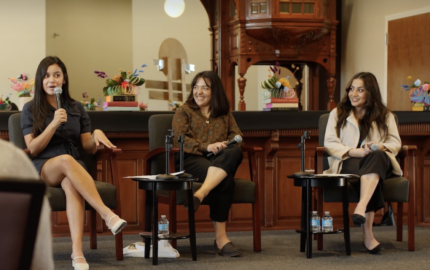Deniz Yücel is the only German journalist who is in prison in Turkey for doing his job. He has been in police custody since February 14, when he turned himself in for questioning. He has been held since that day over terror charges related to his reporting on the leaked emails of Berat Albayrak, Turkey's energy minister and the son-in-law of Turkish President Recep Tayyip Erdogan.
Yücel had reported in December of 2016 on the story which was based on material published on the website RedHack, considered by the Turkish government to be a terrorist organization, and also published on WikiLeaks. His stories, about, among other subjects, alleged attempts to influence press coverage in favor of the government, were published by the German newspaper Die Welt in two installments. Six Turkish journalists were previously taken into custody in connection with these leaks. Yücel, who was not in the country at the time, turned himself in when he got back to Turkey in February.
This is happening in the lead up to the Turkish referendum on a new constitution in April 2017, which will most likely give president Erdogan additional power. But this story is about more than yet another journalist being threatened or punished for work in Turkey, one of the most difficult places for a journalist today.
There is another aspect that makes this story relevant and troubling: The reaction of two major German newspapers, the Süddeutsche Zeitung and the Frankfurter Allgemeine. The papers’ responses highlight the continuing struggle of parts of German society to figure out how to think about the country’s largest group of immigrants, Turks, and the professional and political questions of solidarity with a journalist in danger while freedom of the press is under attack in so many countries around the world.
Surprisingly, the reaction of the Süddeutsche Zeitung and the Frankfurter Allgemeine was not one of solidarity, as one would expect among colleagues in this embattled profession. The Süddeutsche Zeitung criticized and almost mocked Yücel for his work. The Frankfurter Allgemeine discussed if a journalist with a Turkish background should go to Turkey as a reporter at all and if the media company that sent him there is to blame for his predicament.
“Always Turkish” was the headline on the story in the Frankfurter Allgemeine, written by Michael Martens, a longtime foreign correspondent of this traditionally conservative newspaper, which in recent years has tried to sharpen its profile by taking a harder line on refugees. Martens mentions the Yücel case in only the briefest terms and quickly attacks media outlets like Die Welt, which sent Yücel to Turkey, or the liberal weekly Die Zeit, which employs Özlem Topcu, a reporter covering Turkey from time to time.
The argument is that sending journalists with Turkish roots to Turkey would not only put them in danger, but also trap them in their roles as Turkish writers who presumably can only write about Turkish affairs. This is, in fact, very far from what Yücel or Topcu have done in their careers. Both have mainly written about German issue before becoming interested in Turkey. The story was cold and dismissive. “Children of migrants who only write about migration,” Martens wrote, adding: “Yawn!” One has to wonder if it would have had the same tone if the journalist involved had no Turkish roots.
The tone and substance of the liberal-left daily Süddeutsche Zeitung and its author Mike Szymanski, the paper’s correspondent for Greece and Turkey, was similarly dismissive. Yücel’s journalism is one big “Trööt!,” Szymanski mused, comparing it to the honking sound of the traditional Turkish car. Szymanski implied that Yücel saw himself as more of an activist than a journalist, without offering proof to support this claim other than stating that he “took sides with Turkish journalists who had been locked up by the dozens.”
These two columns seem especially troubling at a time when American journalists are slowly coming to understand that what it takes to battle authoritarian governments is more than the craft you learn in j-school. Europe is facing its own challenge of fake news produced in Russia or with the help of Russian resources. The elections in France, the Netherlands, and Germany in the coming months will be targeted by these new means, and the enmity toward the profession is open and sometimes frightening, particularly in Germany where talk of Lügenpresse (“lying press”) sounds distressingly like what people said about the free press when Hitler was in power.
This is the bigger picture in which to consider this unwillingness of two major newspapers to defend the very principles on which they are built, freedom of the press and solidarity among journalists. It suggests that the 43-year-old Yücel, who grew up in a small town in Germany and has dual Turkish and German citizenship, is still seen as an outsider. He was a very funny and well-loved columnist writing polemically about, among other things, German politics, anti-Semitism, and the Pope for the left newspaper die tageszeitung before joining the conservative newspaper Die Welt in 2015 to cover Turkish politics.
He came to Turkey right before things turned from bad to worse. I saw him in Istanbul in October of 2015, and he was excited about the work he was doing, important work in this very crucial country on the border of Europe and Asia, entangled in the Syrian war, a country essential to Germany because of a controversial deal in which Erdogan promised to keep refugees from coming to Europe.
It was in the best interest of a lot of Europe’s ruling parties to keep this deal alive, which might also explain why there has so far been a carefully calibrated reaction to the ongoing threats to Turkish journalists and journalists working in Turkey. Newspapers have been shut down, hundreds of Turkish journalists were put into prison, and Turkey presently ranks at number 151 in terms of press freedom, according to Reporters Without Borders, behind Russia, Mexico, and Tajikistan.
All of this is important to understand what is happening to Deniz Yücel. But maybe most important of all is the very special and delicate relationship Germany has with Turkey due to the history of the Gastarbeiters (“guest workers”), often low-skilled workers from Anatolia hired in the ’60s and ’70s to sustain the German economic boom. A lot of them stayed, changing forever German demographics, at times threatening the understanding of what it means to be a German.
There are now second and a third generations of Germans of Turkish descent—including Yücel and Topcu—making it more relevant to think about German citizenship in a more cosmopolitan way. This poses a problem for this society that is so tightly linked to a view that a German citizen has to be of German origin, being born in Germany not being enough.
Today there are about three to five million Turkish people or people with Turkish roots living in Germany. It is a vibrant and socially, economically, culturally and politically more visible segment of the population. The question of Turkey and the relationship to Germany has become one of German domestic politics.
Still, journalists with Turkish roots are very rare in Germany, as are journalists with any other ethnic background. German journalism remains very homogenous in social and ethnic terms, which is strange in an age of globalization and, one might argue, leads to a certain distortion in the way the world is reported. Diversity in the newsroom, the way Americans realize it should be, is something far removed from a German journalistic reality.
This is relevant in the case of Deniz Yücel because it explains the very uncomfortable situation the German government is facing—trying not to anger an authoritarian partner while still upholding some democratic principles—and to some degree the reaction of the Süddeutsche Zeitung and the Frankfurter Allgemeine—wrestling as much with demographic changes in the country as well as coming to terms with what it means to be a journalist in the age of Erdogan, Trump, and a general onslaught on the notions of fact and truth.
All of this suggests that a more unified stand among journalists in Germany would be a natural option. On Monday of this week, a judge in Istanbul ruled that Yücel will remain in custody, presumably until a future trial. There was also finally a show of solidarity among journalists, 300 of which self-organized and financed ads in national newspapers and online magazines.
Still, the at least partial inability to react to a common threat in a united way might point to a bigger question about the resources Germany has to mobilize against an ongoing threat to democracy. There is no strong history of freedom of thinking in this country, which was marked by fascism and communism in the 20th century, two ideologies based on group think.
It would be dangerous if Germans would fall back into this mode of quiet complacency and lack of principles. Europe, as well as the United States and, for that matter, Turkey, is faced with an authoritarian threat. It is a test of character as well as a test for the spirit, the willingness to fight, and the morals of this profession. This is why the lack of empathy on the part of the Süddeutsche Zeitung and Frankfurter Allgemeine is more than disappointing, it is dangerous.
Yücel had reported in December of 2016 on the story which was based on material published on the website RedHack, considered by the Turkish government to be a terrorist organization, and also published on WikiLeaks. His stories, about, among other subjects, alleged attempts to influence press coverage in favor of the government, were published by the German newspaper Die Welt in two installments. Six Turkish journalists were previously taken into custody in connection with these leaks. Yücel, who was not in the country at the time, turned himself in when he got back to Turkey in February.
This is happening in the lead up to the Turkish referendum on a new constitution in April 2017, which will most likely give president Erdogan additional power. But this story is about more than yet another journalist being threatened or punished for work in Turkey, one of the most difficult places for a journalist today.
There is another aspect that makes this story relevant and troubling: The reaction of two major German newspapers, the Süddeutsche Zeitung and the Frankfurter Allgemeine. The papers’ responses highlight the continuing struggle of parts of German society to figure out how to think about the country’s largest group of immigrants, Turks, and the professional and political questions of solidarity with a journalist in danger while freedom of the press is under attack in so many countries around the world.
Surprisingly, the reaction of the Süddeutsche Zeitung and the Frankfurter Allgemeine was not one of solidarity, as one would expect among colleagues in this embattled profession. The Süddeutsche Zeitung criticized and almost mocked Yücel for his work. The Frankfurter Allgemeine discussed if a journalist with a Turkish background should go to Turkey as a reporter at all and if the media company that sent him there is to blame for his predicament.
“Always Turkish” was the headline on the story in the Frankfurter Allgemeine, written by Michael Martens, a longtime foreign correspondent of this traditionally conservative newspaper, which in recent years has tried to sharpen its profile by taking a harder line on refugees. Martens mentions the Yücel case in only the briefest terms and quickly attacks media outlets like Die Welt, which sent Yücel to Turkey, or the liberal weekly Die Zeit, which employs Özlem Topcu, a reporter covering Turkey from time to time.
The argument is that sending journalists with Turkish roots to Turkey would not only put them in danger, but also trap them in their roles as Turkish writers who presumably can only write about Turkish affairs. This is, in fact, very far from what Yücel or Topcu have done in their careers. Both have mainly written about German issue before becoming interested in Turkey. The story was cold and dismissive. “Children of migrants who only write about migration,” Martens wrote, adding: “Yawn!” One has to wonder if it would have had the same tone if the journalist involved had no Turkish roots.
The tone and substance of the liberal-left daily Süddeutsche Zeitung and its author Mike Szymanski, the paper’s correspondent for Greece and Turkey, was similarly dismissive. Yücel’s journalism is one big “Trööt!,” Szymanski mused, comparing it to the honking sound of the traditional Turkish car. Szymanski implied that Yücel saw himself as more of an activist than a journalist, without offering proof to support this claim other than stating that he “took sides with Turkish journalists who had been locked up by the dozens.”
These two columns seem especially troubling at a time when American journalists are slowly coming to understand that what it takes to battle authoritarian governments is more than the craft you learn in j-school. Europe is facing its own challenge of fake news produced in Russia or with the help of Russian resources. The elections in France, the Netherlands, and Germany in the coming months will be targeted by these new means, and the enmity toward the profession is open and sometimes frightening, particularly in Germany where talk of Lügenpresse (“lying press”) sounds distressingly like what people said about the free press when Hitler was in power.
This is the bigger picture in which to consider this unwillingness of two major newspapers to defend the very principles on which they are built, freedom of the press and solidarity among journalists. It suggests that the 43-year-old Yücel, who grew up in a small town in Germany and has dual Turkish and German citizenship, is still seen as an outsider. He was a very funny and well-loved columnist writing polemically about, among other things, German politics, anti-Semitism, and the Pope for the left newspaper die tageszeitung before joining the conservative newspaper Die Welt in 2015 to cover Turkish politics.
He came to Turkey right before things turned from bad to worse. I saw him in Istanbul in October of 2015, and he was excited about the work he was doing, important work in this very crucial country on the border of Europe and Asia, entangled in the Syrian war, a country essential to Germany because of a controversial deal in which Erdogan promised to keep refugees from coming to Europe.
It was in the best interest of a lot of Europe’s ruling parties to keep this deal alive, which might also explain why there has so far been a carefully calibrated reaction to the ongoing threats to Turkish journalists and journalists working in Turkey. Newspapers have been shut down, hundreds of Turkish journalists were put into prison, and Turkey presently ranks at number 151 in terms of press freedom, according to Reporters Without Borders, behind Russia, Mexico, and Tajikistan.
All of this is important to understand what is happening to Deniz Yücel. But maybe most important of all is the very special and delicate relationship Germany has with Turkey due to the history of the Gastarbeiters (“guest workers”), often low-skilled workers from Anatolia hired in the ’60s and ’70s to sustain the German economic boom. A lot of them stayed, changing forever German demographics, at times threatening the understanding of what it means to be a German.
There are now second and a third generations of Germans of Turkish descent—including Yücel and Topcu—making it more relevant to think about German citizenship in a more cosmopolitan way. This poses a problem for this society that is so tightly linked to a view that a German citizen has to be of German origin, being born in Germany not being enough.
Today there are about three to five million Turkish people or people with Turkish roots living in Germany. It is a vibrant and socially, economically, culturally and politically more visible segment of the population. The question of Turkey and the relationship to Germany has become one of German domestic politics.
Still, journalists with Turkish roots are very rare in Germany, as are journalists with any other ethnic background. German journalism remains very homogenous in social and ethnic terms, which is strange in an age of globalization and, one might argue, leads to a certain distortion in the way the world is reported. Diversity in the newsroom, the way Americans realize it should be, is something far removed from a German journalistic reality.
This is relevant in the case of Deniz Yücel because it explains the very uncomfortable situation the German government is facing—trying not to anger an authoritarian partner while still upholding some democratic principles—and to some degree the reaction of the Süddeutsche Zeitung and the Frankfurter Allgemeine—wrestling as much with demographic changes in the country as well as coming to terms with what it means to be a journalist in the age of Erdogan, Trump, and a general onslaught on the notions of fact and truth.
All of this suggests that a more unified stand among journalists in Germany would be a natural option. On Monday of this week, a judge in Istanbul ruled that Yücel will remain in custody, presumably until a future trial. There was also finally a show of solidarity among journalists, 300 of which self-organized and financed ads in national newspapers and online magazines.
Still, the at least partial inability to react to a common threat in a united way might point to a bigger question about the resources Germany has to mobilize against an ongoing threat to democracy. There is no strong history of freedom of thinking in this country, which was marked by fascism and communism in the 20th century, two ideologies based on group think.
It would be dangerous if Germans would fall back into this mode of quiet complacency and lack of principles. Europe, as well as the United States and, for that matter, Turkey, is faced with an authoritarian threat. It is a test of character as well as a test for the spirit, the willingness to fight, and the morals of this profession. This is why the lack of empathy on the part of the Süddeutsche Zeitung and Frankfurter Allgemeine is more than disappointing, it is dangerous.



